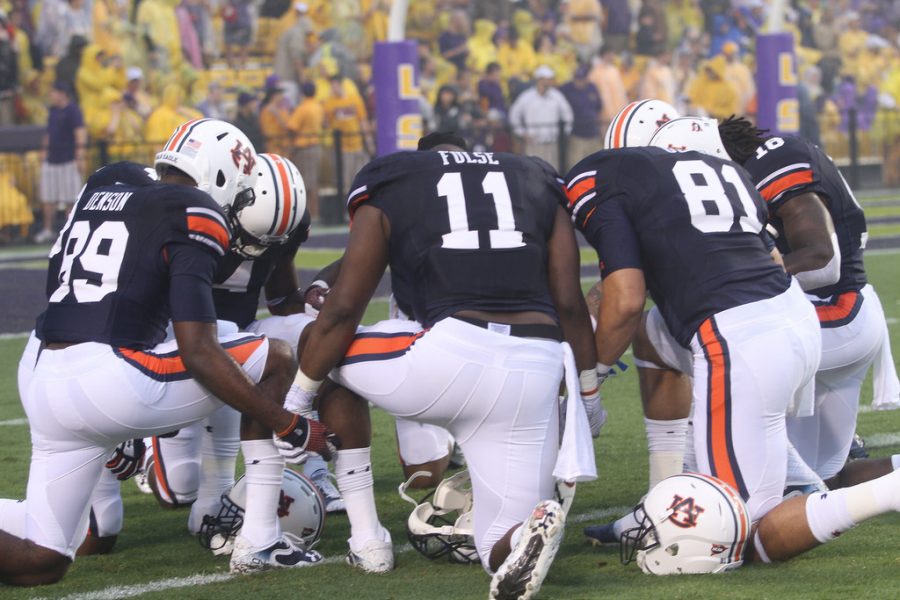Taking a Knee Raises Controversy and Awareness
The #TakeAKnee movement has become a controversial protest by football players seeking to raise awareness of social injustice.
In August of 2016, San Francisco 49ers quarterback Colin Kaepernick decided to sit down during the National Anthem in protest during a preseason game. Later on, in order to show more respect for veterans, he transitioned to taking a knee instead. As of now, there have been countless NFL players who have decided to take a knee during the National Anthem as a form of protest, creating the #TakeaKnee movement. This act of protest is meant to bring serious social issues and tensions in the United States into the public eye.
“I am not going to stand up to show pride in a flag for a country that oppresses black people, and people of color,” Kaepernick said in a press conference. “To me, this is bigger than football, and it would be selfish on my part to look the other way. There are bodies in the street, and people getting paid leave, and getting away with murder.”
Kaepernick personally testified that his actions are simply a protest against police brutality and racial injustice, sharing similar views as the Black Lives Matter movement.
However, many perceive his protest to be simply an act of disrespect towards our flag and towards veterans who fought to grant us the right to protest. At a September 2017 campaign rally, President Trump rekindled the controversy of the protest, condemning sports players for using their Constitutional right to freely protest, and saying he wished that NFL players would be fired for kneeling during the National Anthem.
“The average American cannot protest at work and keep their job. [The protesters are] absolutely disrespecting the flag and the anthem,” math teacher and veteran Ms. Justine Viola said. “We expect students to stand for the flag. We expect them to be respectful of those people who provided them the right to protest.”
As #TakeaKnee protests have become more prevalent in the public eye, the true intentions have been twisted by the media.
“I think [what the protest represents is] very unclear. People have different intentions,” Ms. Viola said. “The original claim was that they were upset by unfair treatment of different races. [I’m] not sure what it morphed into.”
The #TakeAKnee movement is not a protest against Trump or the American flag.
“[The protesters] are not disrespecting the flag, they’re protesting what America represents right now,” senior Nerissa Chase said. “It’s not a violent protest. The action is powerful.”
As the ones who are protesting have said, their purpose is to object to the the prevalence of institutionalized racism in the American justice system. It is meant to highlight the gap between what protesters believe the flag should represent — freedom, liberty, and justice — and the tense social climate that protesters argue contradicts these ideals.
“I think [the protest] really represents people being frustrated with injustice and feeling empowered to use their position and stature to voice solidarity with people who are victims,” social studies teacher Mrs. Katie Quartuch said. “I wish the conversation [about the protest] was more about the cause, rather than the manner of the protest. It is our job to listen to what [the protesters] are saying, rather than to react to what they’re doing. They don’t need to do more. Bringing attention to the cause is part of the protest; that is powerful.”
As Americans, we have First Amendment rights, including freedom of speech and the right to peacefully protest. Since the true intentions of the protest are unclear and unknown to the majority of Americans due to the influence of the media, #TakeaKnee remains a controversial issue. As the dispute of the protest continues, so will feelings of contempt towards an allegedly unfair justice system, and Americans exercising their right to protest their beliefs.

Senior Izza Choudhry is a four-year staff reporter and former one-year copy editor and one-year news editor, now serving as opinion editor for the Spotlight....


